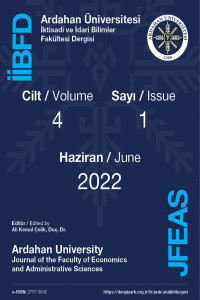Firmalarda nakit kâr payı dağıtım tutarını etkileyen mikro faktörler: BİST sınai endeks firmaları üzerine bir çalışma
Nakit Kâr Payı Politikası, BİST Sınai Endeksi, Panel Veri Analizi
Micro factors affecting cash dividend distribution amount in firms: an analysis on the companies in the BIST industrial index
Cash Dividend Policy, BIST Industry Index, Panel Data Analysis,
___
- Adjaoud, F. ve Ben‐Amar, W. (2010). Corporate governance and dividend policy: shareholders’ protection or expropriation? Journal Of Business Finance & Accounting, 37(5‐6), 648-667.
- Ali, H. (2022). Corporate dividend policy in the time of COVID-19: evidence from the G-12 countries. Finance Research Letters, 46.
- Almeida, L. A. G., Teixeira Pereira, E. ve Oliveira Tavares, F. (2015). Determinants of dividend policy: Evidence from Portugal. Review of Busıness Management, 17(54), 701-719.
- Albayrak. A. S. (2005). Çoklu doğrusal bağlantı halinde en küçük kareler tekniğinin alternatif yanlı tahmin teknikleriyle bir uygulama. ZKÜ Sosyal Bilimler Dergisi, 1(2), 105-126.
- Andres, C., Betzer, A., Goergen, M. ve Renneboog, L. (2009). Dividend policy of German firms. A panel data analysis of partial adjustment models. Journal of Empirical Finance, 16(2), 175-187.
- Bai, J. ve Ng, S. (2004). A panic attack on unit roots and cointegration. Econometrica, 72 (4), 1127–1177.
- Baltagi, B. H., Bratberg, E. ve Holmås, T. H. (2005). A panel data study of physicians' labor supply: the case of Norway. Health Economics, 14(10), 1035-1045.
- Baltagi, B. ve Li, Q. (1991). A joint test for serial correlation and random individual effects. Statistics and Probability Letters, 11, 277-280.
- Barros, V., Verga Matos, P. ve Miranda Sarmento, J. (2020). What firms’ characteristics drive the dividend policy? a mixed-method study on the euronext stock exchange. Journal of Business Research, 115, 365-377.
- Ben Salah, O. ve Ben Amar, A. (2022). Does corporate social responsibility affect dividend policy? empirical evidence in the French context. Journal of Global Responsibility, 13(3), 268-289.
- Born, B. ve Breitung, J. (2016). Testing for serial correlation in fixed-effects panel data models. Econometric Reviews, 35(7), 1290-1316.
- Bölük, Ş. (2015). Anonim şirketlerde kâr dağıtımı. (Yayınlanmamış yüksek lisans tezi). Okan Üniversitesi.
- Breusch, T. ve Pagan, A. (1979). A simple test for heteroscedasticity and random coefficient variation. Econometrica, 47, 1287–1294.
- Cengiz, S., Dilsiz, M. Ş. ve Aslanoğlu, S. (2016). Kâr dağıtım politikasının kazanç yönetimi uygulamaları üzerindeki etkisi. Muhasebe ve Finansman Dergisi, 70, 39-54.
- Gill, A., Biger, N. ve Tibrewala, R. (2010). Determinants of dividend payout ratios: evidence from united states. The Open Business Journal, 3(1), 8-14.
- Gujarati, D.N. (2004). Basic econometrics. The Companies.
- Honda, Y. (1985). Testing the error components model with non-normal disturbances. Review of Economic Studies, 52, 681-690.
- Hung, D. N., Ha, N. V. ve Binh, D. T. (2018). Factors influencing the dividend policy of Vietnamese enterprises. Asian Journal of Finance & Accounting, 10(2), 16-29.
- Im, K., Pesaran, H. ve Shin, Y. (2003). Testing for unit roots in heterogeneous panels. Journal of Econometrics, 115, 53-74.
- Juma’h, A. H., Juan, S., Carlos, R. ve Olivares Pacheco, J. (2008). The financial factors influencing cash dividend policy: A sample of U.S. manufacturing companies. Inter Metro Business Journal, 4(2), 23-43.
- Komrattanapanya, P. ve Suntraruk, P. (2014). Factors influencing dividend payout in Thailand: a tobit regression analysis. International Journal of Accounting and Financial Reporting, 3(2), 255-268.
- Karayalçın, Y. (1988). Muhasebe hukuku. Ankara: Bankacılık ve Ticaret Hukuku Araştırmaları Enstitüsü Yayınları.
- Kuzucu, N. (2015). Determinants of dividend policy: a panel data analysis for Turkish listed firms. International Journal of Business and Management, 10(11), 149.
- Levin, A., Lin, C. ve Chu, C. S. J. (2002). Unit root tests in panel data: asymptotic and finite-sample properties. Journal of Econometrics, 108, 1–24.
- Paramita, R. W. D. (2020). Determinants of dividend policy. Jurnal Ilmu Manajemen Advantage, 4(1), 1-5.
- Pesaran, M. H. ve Yamagata, T. (2008). Testing slope homogeneity in large panels. Journal of Econometrics. 142, 50-93.
- Tabachnick, B. G. ve L. S. Fidell (2001). Using multivariate statistics. Needham Heights, MA, Allyn ve Bacon.
- Yıldız, B. (2014). Firmalarda temettü politikalarını etkileyen unsurlar: BİST sanayi işletmeleri üzerine bir panel veri uygulaması. Ekonomik ve Sosyal Araştırmalar Dergisi, 10(10), 185-206.
- ISSN: 2148-7154
- Yayın Aralığı: Yılda 2 Sayı
- Başlangıç: 2015
- Yayıncı: Ardahan Üniversitesi
Ulusal güvenlik karar problemlerinde karşıtsal risk analizi: Doğu Akdeniz problemi örnek modelleme
Gülşah BOZCU, Esma Nur ÇİNİCİOĞLU
ABD 10 yıllık tahvil faizi ve enerji fiyatlarının seçilmiş borsa endeksleri ile ilişkileri
Hüseyin Başar ÖNEM, Melike YORGANCI
Yapay zekâ ile gelişen ticaretin bankacılık sektörüne etkisi: e-ticaret ve ticari krediler ilişkisi
Hakan YILDIRIM, Bahri Ozan YAMAN
II. Meşrutiyet dönemi Türkçülük fikrinin gelişimi
Adaletin iş ile ilgili tutumlar üzerindeki etkisi: iyimserlik ve dindarlığın rolü
